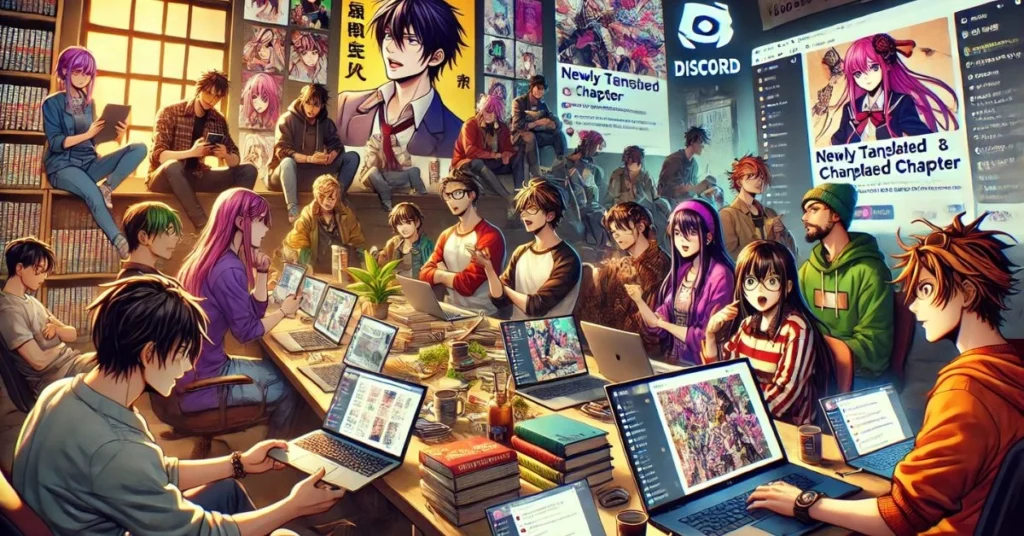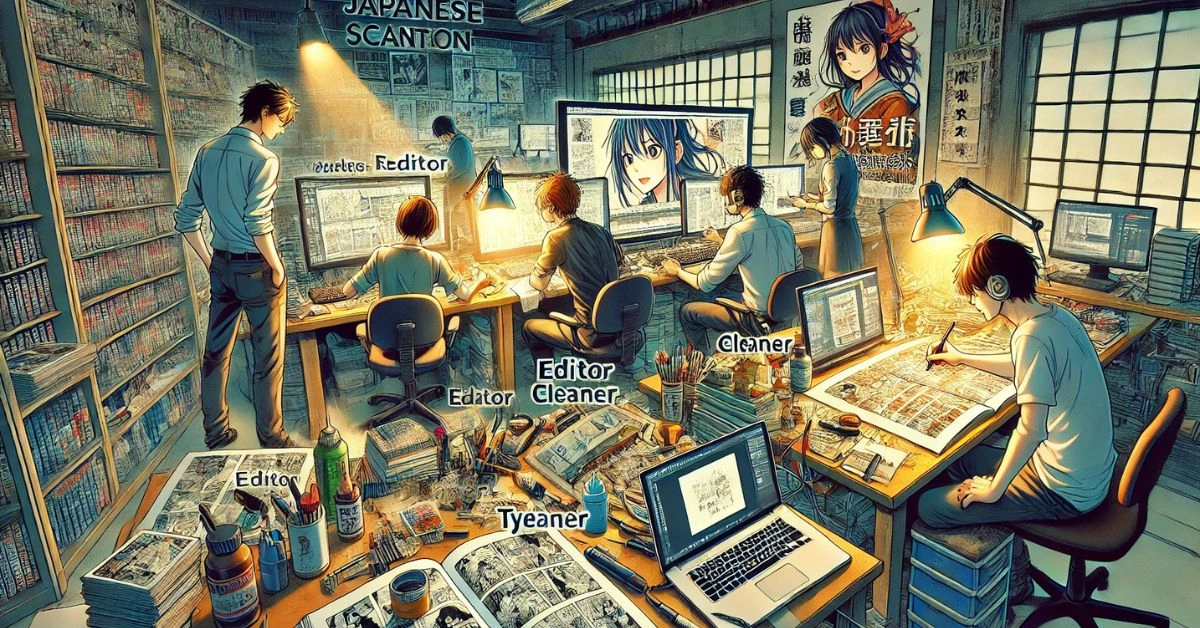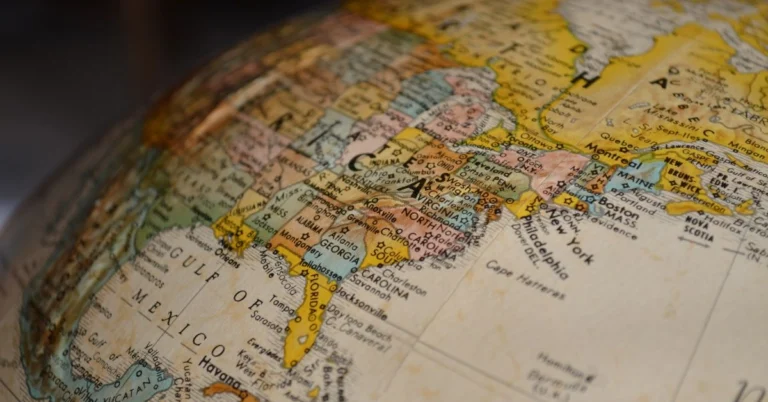TCB Scans: Bridging the Gap in Global Manga Translation
Manga has grown into a global sensation, captivating readers across continents. Originating in Japan, manga has become an art form that resonates with millions of fans worldwide. For many, staying updated with the latest chapters is a thrilling part of their fandom experience.
Scanlation groups, such as TCB Scans, have played a significant role in this journey. TCB Scans specializes in manga scanlation, bringing Japanese stories to a global audience. Known for their speed and accuracy, they provide translations that bridge the gap between fans and creators.
The group’s dedication to quality has earned them trust within the manga fan communities. By preserving the authenticity of each story, they ensure readers connect deeply with the characters and plots. Their efforts have also sparked important discussions about manga accessibility, ethics, and legality.
While TCB Scans operates in a legal grey area, they encourage readers to support official manga releases. This commitment to the industry highlights the passion and responsibility of the team behind the scenes.
This blog post dives deep into the intricate process of manga translation, the impact of scanlation on global manga culture, and the ethical challenges faced by these groups. Let’s explore how scanlation efforts shape the manga community and contribute to its growth.
| Aspect | Fact | Figures/Details |
|---|
| Definition of Scanlation | Manga scanlation is the process of translating and adapting Japanese manga into other languages for a global audience. | Unofficial translations, rapid distribution online. |
| Role of TCB Scans | TCB Scans is a prominent manga scanlation group known for speed and accuracy in translating manga chapters. | Specializes in timely releases, trusted within manga communities. |
| Key Team Roles in Scanlation | Translators, editors, cleaners, and typesetters are involved in the process. | Each member has a specific responsibility in the process: |
| Translator | Converts Japanese text into accurate and natural English. | Requires proficiency in both languages and cultural nuances. |
| Editor | Refines the translation for clarity and authenticity while preserving tone. | Ensures the translated text aligns with the original context and intent. |
| Cleaner | Removes Japanese text from artwork, preserving original design. | Tools like Photoshop are commonly used for this task. |
| Typesetter | Adds translated text to the manga art while maintaining the visual integrity. | Uses software like Photoshop to ensure text fits seamlessly into the artwork. |
| Manga Translation Tools | Modern tools like Photoshop are crucial for cleaning and typesetting. | Other tools include language resources, manga translation software, and design tools for high-quality results. |
| Challenges Faced by Scanlation Teams | Scanlation groups face pressure to balance speed and quality. | Delays may occur, but teams strive for high-quality, timely releases. |
| Global Impact on Fandom | Scanlation brings fans together by enabling them to read manga chapters simultaneously, creating global discussions. | Platforms like Discord, Reddit, and Twitter see spikes in activity following chapter releases. |
| Language Barriers | Scanlation helps break down language barriers, making manga accessible to non-Japanese-speaking fans. | Introduces new readers to manga, broadening the global audience. |
| Online Communities | Scanlation drives online communities through discussions, fan theories, and fan art. | Forums and social media thrive, providing spaces for fans to connect and share content. |
| Ethical Approach of Scanlation | Many scanlation groups encourage readers to support the official manga releases. | Messages in chapters urging fans to buy official releases and merchandise. |
| Legal Issues | Scanlation exists in a legal grey area as it involves translating copyrighted material without permission. | Legal action is rare, but technically a violation of copyright laws. |
| Support for Creators | Scanlation teams encourage fans to support creators by buying official releases to respect intellectual property. | Fan support for creators helps sustain the industry. |
| Criticism from Publishers and Creators | Some creators argue that scanlation affects manga sales, undermining official translations. | This ongoing debate highlights tension between fan-driven efforts and industry needs. |
| Fan Perspective | Fans appreciate scanlation for access but understand the importance of compensating creators. | Scanlation provides access, but fans are encouraged to support official releases. |
| Scanlation’s Contribution to Sales | Scanlation can introduce readers to a manga series, increasing demand for official releases. | Many fans discover series via scanlation, later purchasing official versions and merchandise. |
| Quality Assurance in Scanlation | Scanlation teams use a detailed process to ensure high-quality translations, including editing and typesetting. | The process includes multiple quality checks to ensure accuracy, clarity, and visual integrity. |
| Ways for Fans to Support Creators | Fans can support creators by buying official manga volumes, subscribing to legal digital platforms, and purchasing merchandise. | Helps ensure creators are compensated and can continue producing new content. |
Behind the Scenes: The Art and Methodology of Manga Translation Teams

The People Behind the Work: Team Roles and Responsibilities
Manga translation teams are composed of dedicated volunteers who are passionate about sharing stories. Each member plays a vital role in the manga translation process. Translators, editors, cleaners, and typesetters collaborate to create polished releases for fans.
Translators focus on converting Japanese text into accurate and natural English. Editors refine the text to ensure it sounds authentic while staying true to the original tone. Cleaners and typesetters use advanced manga translation software and techniques to ensure the final product is visually seamless.
Step-by-Step Workflow: How a Chapter Comes to Life
The process begins with acquiring raw manga scans upon their Japanese release. Translators work on creating accurate translations, followed by editors who ensure quality and clarity. Next, cleaners remove Japanese text from the artwork, preserving its integrity, and typesetters add the translated text.
The manga translation workflow involves multiple quality checks to deliver a high-standard chapter. This process requires a balance of speed and precision, especially for popular series with high fan demand. Despite tight deadlines, the team ensures that every release meets the expectations of readers.
The Tools of the Trade: Software and Techniques
Advanced tools are critical for the success of manga scanlation teams. Programs like Photoshop are commonly used for cleaning and typesetting, while translation teams rely on language resources for accuracy. These tools, combined with careful attention to detail, ensure the final product is both authentic and visually appealing.
The use of modern manga translation techniques allows teams to handle even the most complex pages effectively. From intricate artwork to challenging dialogue, the process is designed to maintain the original essence of the manga.
Overcoming Challenges: Time and Quality Pressure
Manga translation groups face significant challenges in their work. Delivering timely releases while maintaining high-quality translations is no small feat. The pressure to meet fan expectations while preserving the integrity of the story is constant.
Delays can occur due to the intricate nature of the work or unexpected issues. However, fans are often understanding, knowing the dedication that goes into the process. Balancing speed and quality is a hallmark of professional scanlation efforts.
Global Impact: How Scanlation Shapes the Manga Community

Bringing Fans Together: The Impact on Manga Fandom
Manga scanlation has transformed how fans experience their favorite stories. By providing timely releases, translation groups enable readers to engage with new chapters simultaneously. This shared excitement strengthens the bonds within manga fan communities.
The release of new chapters often sparks discussions across forums, Discord servers, and social media. Fans analyze plot twists, character arcs, and themes, creating vibrant online communities. These interactions highlight the importance of scanlation in connecting global audiences.
Breaking Language Barriers: Making Manga Accessible Worldwide
For non-Japanese-speaking fans, scanlation is essential for manga accessibility. Translation teams break down language barriers, allowing fans from different countries to enjoy their favorite stories. This inclusivity has introduced countless people to manga culture.
Manga translation teams often introduce readers to series they might not have discovered otherwise. This leads many fans to purchase official manga releases, supporting creators and publishers. By expanding access to manga, scanlation contributes to its growing popularity worldwide.
Building Online Communities: Forums, Discord, and Social Media
Scanlation groups play a central role in fostering online communities. Their releases act as a catalyst for discussions, fan art, and theories. Platforms like Discord, Reddit, and Twitter thrive on the excitement generated by timely translations.
These online spaces are not just discussion hubs—they are places where fans forge connections. Shared passion for manga unites people from different cultures and backgrounds, creating a sense of belonging within the community.
Encouraging Support for Creators
While scanlation is unofficial, many groups actively encourage readers to support the industry. Messages within chapters often promote purchasing official manga volumes or merchandise. This ethical approach reflects their respect for creators and publishers.
By introducing fans to manga through high-quality translations, scanlation groups indirectly contribute to the success of official releases. Fans who discover a series through scanlation often become loyal supporters of the creators’ work.
Ethical and Legal Dimensions of Scanlation

Navigating the Legal Grey Area
Scanlation operates in a space where legality is often unclear. Manga is protected by copyright laws, and unauthorized translations technically infringe on these rights. However, legal action against fan translation teams is uncommon, allowing them to continue their work.
Balancing Passion and Ethics
Manga translation groups face a delicate ethical balance. While they aim to make stories accessible globally, they also distribute content without formal approval. Many address this by urging fans to buy official manga releases and support the creators.
The Positive Impact of Fan-Led Efforts
Despite its unofficial nature, scanlation benefits the manga community. By introducing manga to international audiences, it keeps fans engaged with ongoing series. Many readers discover and later invest in official translations, boosting industry growth.
Criticism from Publishers and Creators
Some creators and publishers argue that scanlation undermines official translations and affects sales. This tension highlights the challenges of balancing fan-driven efforts with the needs of the industry. However, the debate continues as both sides recognize the cultural significance of scanlation.
The Fan Perspective
For fans, scanlation creates a moral question. It provides access to beloved manga but raises concerns about fairness to creators. Supporting official releases is a way for fans to enjoy their favorite series while respecting the work behind them.
Conclusion
Manga scanlation has had a profound impact on the global manga community, playing an essential role in connecting readers from all over the world with Japanese stories. The hardworking translation teams who bring these works to life provide invaluable access to content that would otherwise be out of reach for non-Japanese-speaking audiences. Scanlation has bridged language gaps, sparked vibrant discussions, and contributed to the growth of manga culture across the globe.
However, the practice exists in a legal grey area and raises ethical concerns regarding copyright and the financial wellbeing of creators. Despite these challenges, the manga community has grown stronger through the support and dedication of scanlation groups. By encouraging readers to also support official releases, scanlation teams foster a healthy relationship between fans, creators, and the wider manga industry.
As manga continues to thrive internationally, the relationship between unofficial translations and the official industry remains complex. Fans are urged to consider the importance of supporting the creators they love, and to participate in discussions about how to balance passion with respect for the intellectual property rights of manga creators.
What is manga scanlation?
Manga scanlation refers to the process of translating and adapting Japanese manga into other languages for a global audience. Scanlation teams typically work unofficially, creating translations of manga chapters as quickly as possible and distributing them online.
Why is manga scanlation important?
Scanlation makes manga accessible to a broader audience, especially to those who don’t speak Japanese. It helps to introduce new readers to series they may not have found otherwise, thereby expanding the global manga community.
Is scanlation legal?
Scanlation exists in a legal grey area. While it involves translating and distributing copyrighted material without permission, legal action against scanlation teams is rare. Still, it is technically a violation of copyright laws.
Are scanlation groups ethical?
Scanlation groups typically strive to maintain ethical standards. Many encourage readers to support official manga releases by purchasing volumes or merchandise. While they aim to make manga accessible, they also understand the importance of compensating creators.
How does scanlation impact manga sales?
While some creators and publishers express concern that scanlation may hurt sales, many readers discover and support official releases after reading a series through scanlation. In many cases, scanlation can boost the popularity of a manga, leading to increased demand for official translations and products.
How do scanlation groups ensure quality?
Scanlation teams use specialized software and work through a step-by-step process to ensure high-quality translations. This includes translating the text, editing for clarity and tone, cleaning the artwork, and typesetting the translated text to make it look seamless within the manga’s original art.
How can fans support creators despite using scanlation?
Fans who enjoy manga through scanlation can support creators by purchasing official manga volumes, subscribing to legal digital platforms, and buying merchandise. This helps ensure that creators are compensated for their work, allowing them to continue producing content.







